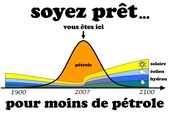All of the resources that the planet is able to renew in a year will have been consumed Thursday August 13, placing humanity in an ecological debt by December 31, a phenomenon that is accelerating, according to the NGO Global Footprint Network. The "day of the overtaking", or "overshoot day" in English, falls this year on August 13, says the organization that found that it occurs earlier and earlier, a sign of consumption increasingly out of sync with available resources.
Last year, he intervened August 17, recalls in a statement the California-based NGO that draws up this assessment every year, sometimes slightly rectifying, retrospectively, the dates announced in previous years because of progress in its methodology and updates to the data.
In 1970, the "day of the overrun" had not occurred until December 23. But since then, its date has continued to decline: November 3 in 1980, October 13 in 1990, October 4 in 2000, September 3 in 2005, August 28 in 2010.
This year, "it will have taken humanity less than eight months to consume all the renewable natural resources the Earth can produce in a year," laments GlobalFootprint Network, "a clear indication that the process of depleting natural resources is s 'accelerated". “This illustrates the incredible and unsustainable pace of global development,” underlines Pierre Cannet, energy / climate manager at WWF France.
"We are on a bad slope. By 2030, we risk reaching overconsumption in June," he told AFP, expressing however the hope that "ambitious targets for reducing CO2 emissions "will push back the date of the" overshoot day ".
1,6 planet to support the needs of humanity
According to Global Footprint Network, it would take 1,6 Planet to support the current needs of humanity. The NGO takes into account for its calculations the carbon footprint, resources consumed for fishing, livestock, crops, construction and water.
In 2030, if the global emissions of carbon dioxide (CO2) do not decrease, the world population will have swallowed up its "ecological budget" as of June 28. On the other hand, "if we reduce our CO2 emissions by 30%" from their current level, the "day of the exceedance" will be moved back to September 16, according to the NGO.
"Reducing carbon emissions would not only slow down global warming", the objective of the world conference which will meet in Paris next December, but also "reduce the ecological footprint on a global scale", underlines Global FootprintNetwork .
The "reduction in human demand for natural resources (...) would represent the first serious chance to reduce the ecological deficit which has been growing irreparably since the 1970s", she adds.
http://www.challenges.fr/monde/20150813 ... mmees.html



